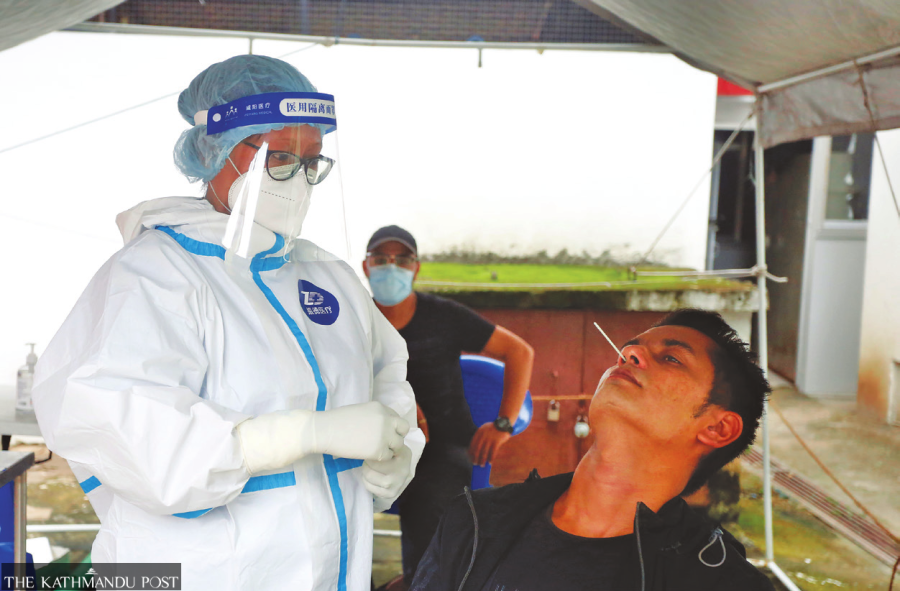Health
Pandemic and Covid vaccination affect several other health programmes
Despite the increasing burden of diseases and responsibilities, there have been no significant increments to the human resource, officials say.
Arjun Poudel
Health Office Lalitpur could not purchase a heating system for birthing centres in the ongoing fiscal year. Neither could it run a programme targeting adolescent health. The provincial government had allocated a special grant of Rs15 million for the two programmes but the amount has frozen as it remained idle throughout the fiscal year.
Things run along the same line at the Health Office Kathmandu. Officials said that they could not organise health camps targeting the elderly people in the ongoing fiscal year. Several other programmes including awareness drives on the risk of tuberculosis infection and tobacco consumption were also affected.
Most of the departments and divisions under the Health Ministry have a long list of the programmes affected by the pandemic. According to officials, the pandemic and the use of health resources for vaccination against Covid-19 kept the offices from carrying out their programmes.
“We could not implement several health programmes not because they are less important,” said Satish Bista, chief of Health Office Lalitpur. “Those programmes are important and must be implemented.”
Officials at the Ministry of Health and Population say that health programmes have taken a hit since the start of the Covid-19 pandemic, in early 2020.
“Yes, all health programmes are important and prioritised,” said Dr Samir Kumar Adhikari, joint-spokesperson at the Health Ministry. “But they have been affected due to an increase in workload.”
Despite the increasing burden of diseases and responsibilities, there have been no significant increments to the human resource, officials say.
“Monsoon has started, and with that, the risk of disasters and outbreak of many vector borne and water borne diseases grows,” said Adhikari. “Chances of an outbreak after the disasters always remain high. Health workers have to work to contain possible outbreaks in the aftermath of the disasters and remain vigilant to possible outbreaks of communicable diseases.”
The Health Ministry has already opened Covid-19 booster shots to individuals between 12 and 17 years. But for most of the local units in the country, starting the booster programme has been tough given the huge workload they are already reeling under.
“We have to launch a pneumonia vaccination programme for elders and are preparing to provide Covid vaccines to children between five and 11 years old,” said Bista, the chief of Health Office, Lalitpur. “We can only start the booster campaign for 12–17-year-olds after the completion of planned programmes.”
Experts say that most health programmes are important and must be implemented to achieve the desired goals. They say that a lack of contingency plan and preparedness and the culture of government agencies shirking their responsibilities are behind the inability to carry out the health programmes.
“We cannot escape from our responsibilities on the pretext of the pandemic or vaccination drive, as it’s already two years since the pandemic started,” said Dr Senendra Upreti, former secretary at the Ministry of Health. “We must make preparedness plans and do micro planning to implement the programmes.”
With the start of the pandemic, several health programmes were instantly affected. Case detection of tuberculosis declined to 50 percent after the Covid-19 outbreak. People having mental issues were deprived of medications; malnutrition cases saw a rise; regular immunisation rate declined; outbreak of measles was reported in many districts including in Kathmandu; institutional delivery rate declined; and antenatal and postnatal visits also saw a drop.
“We should not offer an excuse of the pandemic for our inability to execute the programmes,” said Upreti. “And what we should not forget is this is neither the first nor the last pandemic.”
Apart from implementing regular health programmes, authorities have to deal with several other outbreaks and epidemics every year. Doctors say even if the awareness programme does not have immediate impact, it’s significant in the long run.
Awareness programmes are necessary for changing public perception and behaviour, said Dr Radhika Thapaliya, a risk communication expert. Without an awareness drive, it is difficult to achieve behavioural change, she added.
“It is the first step to provide knowledge and information to the public,” Thapaliya said. “It is imperative that every health programme is duly implemented.”




 14.12°C Kathmandu
14.12°C Kathmandu















